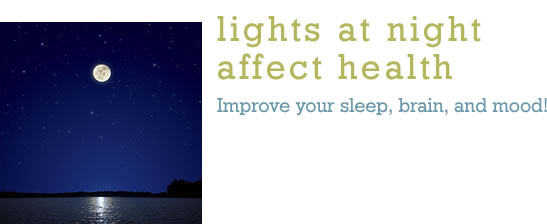Health Tips - Lights at Night Affect Health

The pineal gland is a light-sensitive organ in the brain that produces melatonin during darkness. Humans begin producing melatonin as early as 3 months old. The production of melatonin increases until about age 20 at which point melatonin production begins to decrease.
Melatonin affects sleep and temperature. It helps fight a wide range of cancers and guards the nervous system against degeneration—such as Alzheimer’s disease and stroke. Low levels of melatonin have been connected to depression, bone loss, fibromyalgia, insomnia, some seizure disorders and migraines.
Bodies are healthiest when they have about 9 - 10 hours of melatonin production per day. This means that the light going into your eyes needs to be low to none or of a certain kind for 9 – 10 hours per day.
Before electricity, people had healthy amounts of darkness per day. Low lights such as fires, candles and moonlight worked well. With the arrival of electricity, computers and DVD and TV lights, people spend less time in darkness. As a result, the amount of time that melatonin is produced has dropped significantly.
Research has shown that the part of the light spectrum that stops melatonin production is the blue part. A simple solution is to block blue light two or three hours before bedtime. Wearing blue-blocking glasses over your own glasses before bed really helps. (Click here to purchase from my Front Desk for $25 + tax, or phone 818-808-0899.) Another option is to put blue-blocking filters over your computer, TV and DVD at night.
Most people report a definite improvement in their sleep after doing this for only three or four days. It is thought to make more melatonin available by the time a person goes to bed, causing sleep to come more quickly and deeply.
Who can't use better sleep, mood and health?
Cooperating with your body’s inborn rhythms may save you trouble in the long run.
If you are having trouble falling asleep, or staying asleep through the night, set up a phone consultation with me to discuss what you can do. Be sure to read the other tips in my sleep and bedrooms series to learn how to get your best rest.
Dr. Pepi
May 12, 2009
